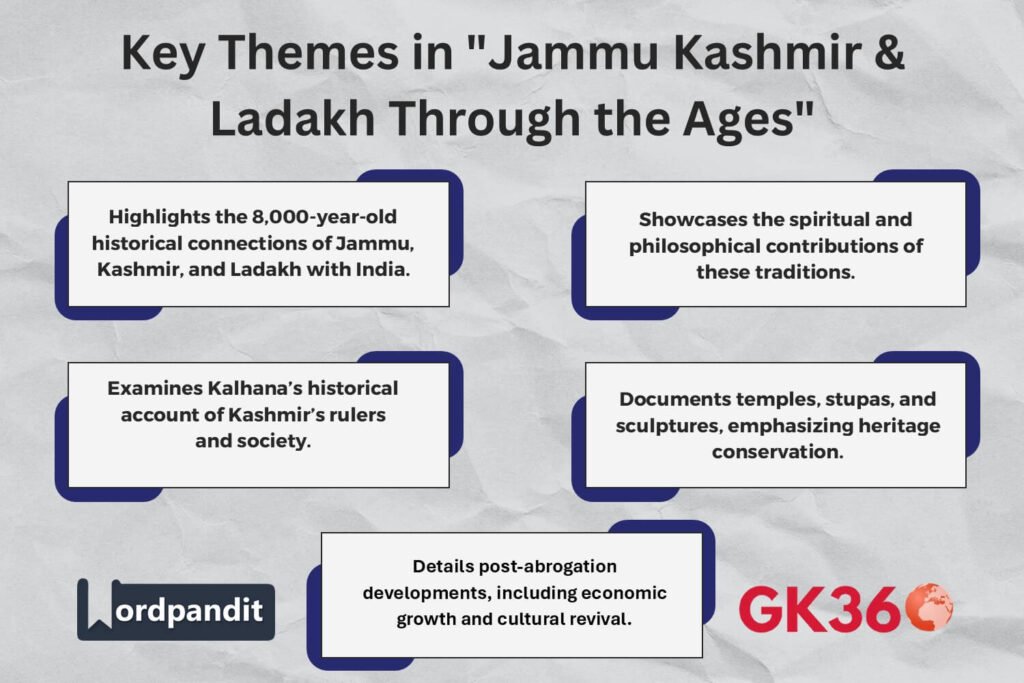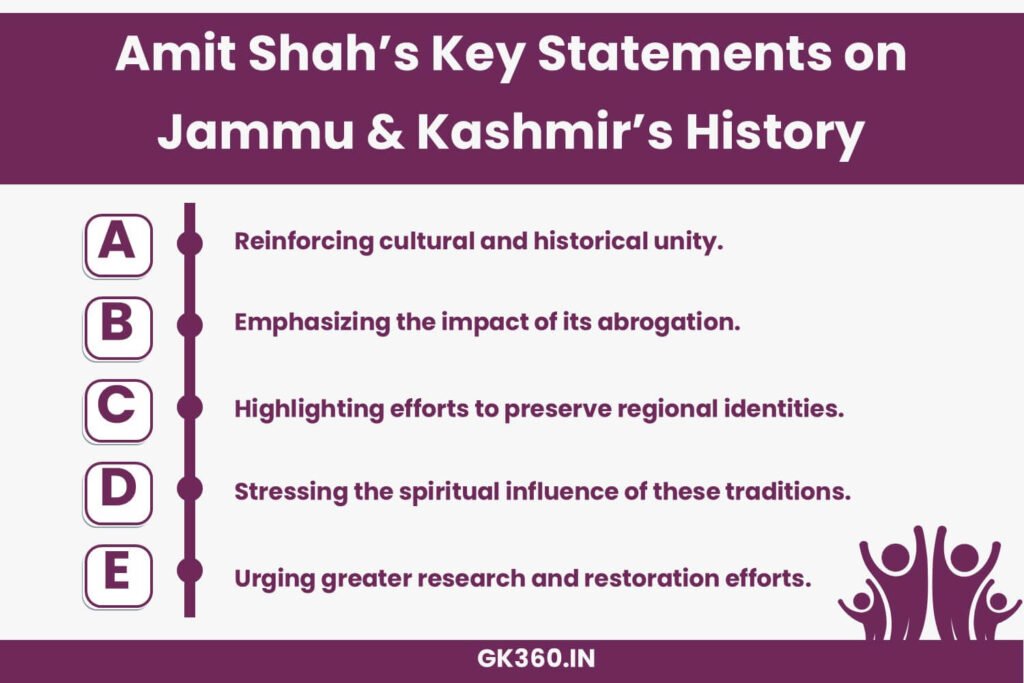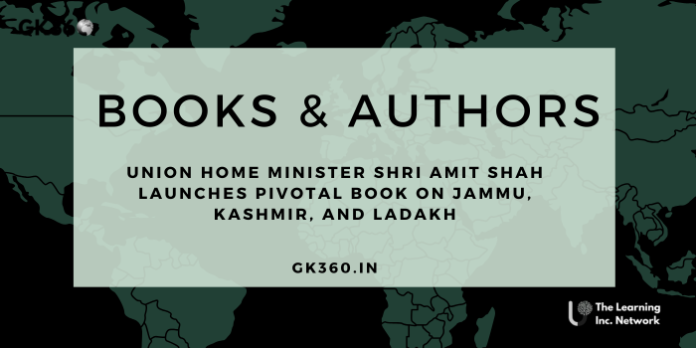Jammu Kashmir & Ladakh: Amit Shah Unveils Book on India’s Cultural Legacy
Introduction: A Landmark Book on Jammu & Kashmir’s Cultural Legacy
Union Home Minister and Minister of Cooperation, Shri Amit Shah, unveiled an important book titled “Jammu Kashmir & Ladakh Through the Ages: A Visual Narrative of Continuities and Linkages” at an event in New Delhi. Published by the National Book Trust, the book aims to provide a comprehensive perspective on the historical, cultural, and spiritual legacy of Jammu, Kashmir, and Ladakh as an inseparable part of India.
The event was graced by distinguished personalities, including Union Minister of Education Shri Dharmendra Pradhan and ICHR Chairman Prof. Raghuvendra Tanwar. In his address, Shri Amit Shah emphasized that the book plays a crucial role in countering misinformation about the region and re-establishing its deep-rooted connection with the Indian civilization.

Table of Contents
- Introduction: A Landmark Book on Jammu & Kashmir’s Cultural Legacy
- The Significance of “Jammu Kashmir & Ladakh Through the Ages”
- Kashmir, Ladakh, and Their Historical Connections
- The Role of Buddhism, Shaivism, and Cultural Influences
- The Influence of Rajatarangini & Sanskrit Texts
- Artifacts and Archaeological Insights
- The Impact of Article 370’s Abrogation
- Key Takeaways from Amit Shah’s Speech
- FAQs on Jammu, Kashmir, and Ladakh’s Historical Legacy
- Conclusion: Preserving India’s Rich Heritage
The Significance of “Jammu Kashmir & Ladakh Through the Ages”
This publication is a meticulously researched account that refutes claims of India’s historical disunity. It presents Kashmir’s pivotal role in shaping India’s civilization over 8,000 years, emphasizing its contributions to spiritual, cultural, and linguistic heritage. By analyzing historical events, cultural exchanges, and ancient scriptures, the book reinforces the idea of a unified Indian identity.
Kashmir, Ladakh, and Their Historical Connections
The book provides a detailed examination of how Jammu, Kashmir, and Ladakh have been intrinsically linked with India’s broader historical narrative. Key highlights include:
- The geographical and cultural interconnectivity between the northern and southern parts of India.
- Historical records showcasing trade, pilgrimage routes, and knowledge exchanges between Kashmir and the rest of India.
- The linguistic and artistic similarities observed across different regions of India.
The Role of Buddhism, Shaivism, and Cultural Influences
The book extensively covers the role of Buddhism, Shaivism, and other spiritual traditions in shaping Kashmir and Ladakh’s cultural identity:
- Kashmir’s role as a crucial center for Buddhist teachings, connecting India with Afghanistan, Tibet, and Central Asia.
- The spread of Shaivism and its profound impact on Indian philosophy and religious practices.
- The influence of Sufi traditions, which contributed to Kashmir’s composite culture and heritage.
The Influence of Rajatarangini & Sanskrit Texts
One of the most significant contributions of the book is its exploration of historical texts, particularly Rajatarangini, written by Kalhana in the 12th century. The book discusses:
- The historical accuracy and significance of Rajatarangini.
- References to ancient rulers, cultural practices, and socio-political conditions of Kashmir.
- How Sanskrit literature preserved Kashmir’s intellectual contributions to Indian civilization.
Artifacts and Archaeological Insights
The book presents a visual and scholarly narrative of Kashmir and Ladakh’s rich archaeological heritage, including:
- Sculptures, stupas, and temples from different dynasties.
- Destroyed heritage sites due to invasions and conflicts.
- The reconstruction efforts and importance of heritage conservation.
The Impact of Article 370’s Abrogation
Shri Amit Shah credited Prime Minister Narendra Modi for the historic decision to abrogate Article 370 on August 5, 2019. He described the move as a turning point in Jammu and Kashmir’s history, ensuring:
- Greater integration of the region with the rest of India.
- A 70% reduction in terrorist activities.
- The recognition and preservation of regional languages such as Kashmiri, Balti, Dogri, and Ladakhi.
Key Takeaways from Amit Shah’s Speech
During his speech, Shri Amit Shah made several key declarations:
- “Kashmir is an inseparable part of India.” – Reinforcing India’s firm commitment to the region.
- “Article 370 was a facilitator of terrorism.” – Highlighting the significance of its abrogation.
- “Kashmir’s cultural and linguistic heritage is now secure.” – Emphasizing the government’s efforts in preserving regional identities.

FAQs on Jammu, Kashmir, and Ladakh’s Historical Legacy
- What is the main objective of the book “Jammu Kashmir & Ladakh Through the Ages”? The book aims to educate readers on the historical and cultural unity of Jammu, Kashmir, and Ladakh with the rest of India.
- How does the book contribute to countering misinformation? It provides fact-based historical narratives and archaeological evidence to refute claims of disunity.
- What role did Buddhism and Shaivism play in Kashmir’s history? Both played a significant role in shaping religious and philosophical traditions, influencing art, literature, and spiritual practices.
- Why was Article 370 significant in Kashmir’s history? Article 370 hindered full integration with India, and its abrogation has led to greater security and economic development.
- How can readers access this book? The book is available via the National Book Trust and various online and offline bookstores.
Conclusion: Preserving India’s Rich Heritage
The launch of “Jammu Kashmir & Ladakh Through the Ages” marks an important step in documenting India’s cultural and historical unity. By addressing misconceptions, preserving linguistic diversity, and promoting archaeological research, the book reinforces the deep-rooted bonds between these regions and India.
Key Takeaways Table
| Aspect | Details |
|---|---|
| Book Title | “Jammu Kashmir & Ladakh Through the Ages” – A historical and cultural narrative. |
| Published By | National Book Trust (NBT) – Documenting India’s civilizational heritage. |
| Key Historical Themes | Buddhism, Shaivism, Rajatarangini, Sanskrit literature, and archaeological findings. |
| Political Context | Article 370’s abrogation led to increased integration and stability. |
| Amit Shah’s Perspective | Book aims to counter misinformation and highlight J&K’s deep Indian roots. |
| Cultural Impact | Preserving regional languages and heritage sites in J&K and Ladakh. |
| Future Outlook | Strengthening research, tourism, and conservation efforts. |
Related terms
- Jammu Kashmir Ladakh History
- Amit Shah Book Launch
- Jammu Kashmir Cultural Legacy
- Rajatarangini & Kashmir Heritage
- Buddhism & Shaivism in Kashmir
- Article 370 and Kashmir’s Future
- Archaeology of Jammu & Kashmir
- Sanskrit Texts on Kashmir
- National Book Trust Publications
- Jammu Kashmir India’s Integration





